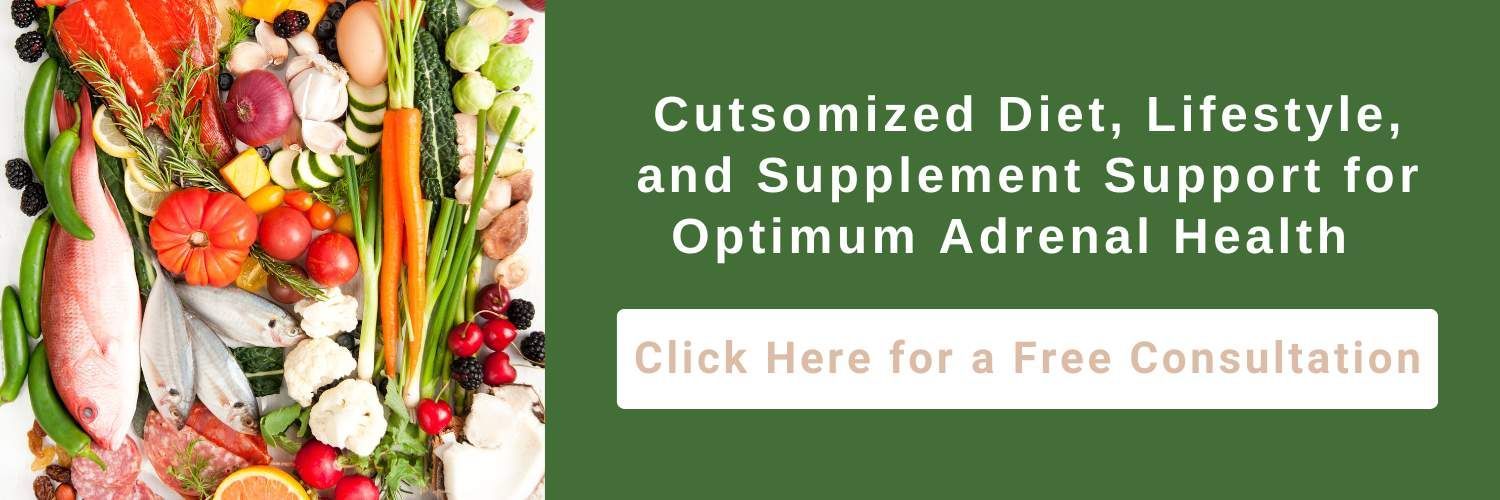The Best Adrenal Belly Fat Diet: How To Lose That Stubborn Adrenal Belly
"The content below is not intended to be a substitute for professional medical advice, diagnosis, or treatment. Always seek the advice of your physician or other qualified health provider with any questions you may have regarding a medical condition."
You’re watching what you eat. You’re trying to exercise (when you don’t feel too exhausted to get a workout in). Still, you can’t seem to lose that extra weight around your midsection.
Don’t be too hard on yourself.
Your adrenals may be to blame.
If you’re not familiar with your body’s adrenals, don’t worry. This guide has you covered.
Read on to learn about:
- Adrenal fatigue
- How your adrenals may be contributing to that stubborn belly weight that doesn’t seem to budge
- How diet, lifestyle, and supplement changes can help
Table of Contents
- What Are Adrenals and How Are They Connected to Belly Fat?
- What is Cortisol?
- What Does an Adrenal Fatigue Belly Look Like?
- What Are the Signs of Adrenal Fatigue?
- Can Adrenal Fatigue Make it Hard to Lose Weight?
- How Do You Lose Adrenal Belly Fat?
- What is the Best Adrenal Fatigue Diet to Lose Weight?
- 5 Ways to Reduce Stress Naturally
- Get To Root Causes and Actionable Solutions to Adrenal Belly Fat With Help From HealthierU
What Are Adrenals and How Are They Connected to Belly Fat?
Adrenals or adrenal glands are small, triangular-shaped glands located at the top of both kidneys. They’re also known as suprarenal glands.
Adrenal glands produce hormones.
These hormones include:
- Cortisol
- Aldosterone
- Androgens/estrogens
- Adrenaline/noradrenaline
The hormones produced by your adrenal glands are responsible for helping to regulate your:
- Metabolism
- Immune system
- Blood pressure
- Response to stress
Adrenal fatigue happens when your adrenal glands function below the necessary level, leaving you exhausted and burnt out, regardless of how much sleep you get.
When adrenal glands produce too much cortisol, it may cause weight gain and fatty deposits in the:
- Face
- Below the back of the neck
- Abdomen
HealthierU helps patients overcome their health issues with nutrition and lifestyle guidance rather than medication or surgery. Dr. Donna Sergi has helped thousands of patients remedy problems with:
- Back pain
- Digestive health
- Acid reflux
- Anxiety
- Stubborn adrenal belly fat
- And more
Nutritional therapy with HealthierU may be exactly what you need to combat adrenal fatigue and the stomach fat that often comes with it.
What is Cortisol?
Cortisol is your body’s primary stress hormone. It’s often described as the body’s built-in alarm system. Cortisol works with other parts of your brain to control your:
- Mood
- Motivation
- Fear
Cortisol also plays a role in:
- Fueling your body’s “fight or flight” system in a crisis
- Managing how your body uses carbohydrates, fats, and proteins
- Keeping inflammation down
- Regulating your blood pressure while increasing your blood sugar (glucose)
- Controlling your sleep/wake cycle
- Boosting energy so you can handle stress and restores balance afterward
Does Stress Make You Fat?
Can you blame stress for some extra weight?
Yes. It’s entirely possible.
Researchers think that an increase in cortisol levels from stress can cause weight gain, especially around your midsection.
Additionally, elevated cortisol levels can stimulate insulin release and increase blood sugar levels, resulting in an increase in appetite.
That increased appetite doesn’t help when you’re trying to get your weight under control.
What Does an Adrenal Fatigue Belly Look Like?
The adrenal belly is common in women. Adrenal belly fat appears as a “ponch” right below the natural waist. It’s often referred to as a “spare tire” or a “muffin top.”
Even if you feel like you’re doing everything right — you’re exercising, you’re making healthy food choices, you’re drinking adequate water — but that “muffin top” still won’t go away, you’re not alone.
Bottom line: if you’re not lowering your cortisol levels, it likely won’t get any easier to get your jeans buttoned up.
What Are The Signs of Adrenal Fatigue?
Do you think you’re suffering from adrenal fatigue?
Signs of adrenal fatigue or adrenal insufficiency include:
- Chronic fatigue
- Body aches
- Lightheadedness
- Craving sweet or salty foods
- Digestive issues
- Low blood pressure
Can Adrenal Fatigue Make it Hard to Lose Weight?
In a word, absolutely.
If you’re suffering from adrenal fatigue, you’ve got a few things working against you.
- Hormones may be wreaking havoc on your food choices, causing you to crave junk food. When we’re stressed out, we don’t always take the time to cut up fruits and vegetables or fill up on other healthy choices. Instead, we reach for chips, cookies, and calorie-laden comfort foods.
- Excess cortisol may mean an increase in appetite, causing you to overeat.
- Chronic fatigue and body aches may dissuade you from exercise.
Plus, the excess weight around your waist can be the most difficult to lose.
On top of that, losing weight isn’t as easy as fewer calories consumed than calories burned. Every person and every human body is different.
Weight gain and visceral fat around the midsection are often an indication that something in your system is out of balance. So, if you feel like you’re exercising regularly and eating a balanced diet, but the scale still won’t budge, it may be time to address other possible issues.
In addition to adrenal fatigue, this stubborn belly fat may be a sign of:
A hormone imbalance
An imbalance of gut bacteria
How Do You Lose Adrenal Belly Fat?
You might think doing a ton of abdominal exercises is the answer to losing adrenal belly fat. Though ab exercises can help, losing adrenal belly fat involves a strategic plan that may include:
- Nutritional food choices
- Regular exercise
- Supplementation
- Quality sleep
- Stress management
What Is the Best Adrenal Fatigue Diet To Lose Weight?
The weight loss industry is a multi-billion dollar business. Despite that fact, you probably know by now that there is no magic pill, potion, or exercise routine that will banish belly fat instantly.
As mentioned, no two bodies are the same, so what works for one person might not work for another.
Before deciding on a diet to address your adrenal fatigue weight gain, it’s essential to figure out what caused the fatigue in the first place.
Is stress to blame? What about toxins? Do you have a nutrient deficiency?
This is where HealthierU comes in.
Dr. Sergi believes in discovering the causes of many symptoms and addressing them nutrition and lifestyle guidance. Contact HealthierU today so Dr. Sergi can help you begin your journey to wellness with customized diet, lifestyle, and supplement support.
Best Foods For Reducing Adrenal Stomach Fat
If you’re looking to reduce adrenal stomach fat, you’ll want to make sure your diet includes plenty of protein and healthy fats as well as foods that are high in:
Best Food Sources For Vitamin B
If you’re looking to increase your intake of Vitamin B, you’ll want to make sure your refrigerator and pantry are stocked with:
- Salmon
- Leafy greens, including: spinach, collard greens, turnip greens, and romaine lettuce
- Liver and other organ meats
- Beef
- Milk
- Eggs
- Yogurt
- Shellfish, including: clams, mussels, and oysters
- Legumes, including: black beans, chickpeas, kidney beans, pinto beans, lentils, green peas, edamame, and soy nuts
- Chicken
- Turkey
- Pork
- Trout
- Sunflower seeds
- Fortified cereals
Best Food Sources For Vitamin C
Vitamins C comes from fruits and vegetables. Good sources for Vitamin C include:
- Citrus: oranges, lemons, grapefruit
- Bell peppers
- Strawberries
- Tomatoes
- Broccoli
- Greens: kale, turnip greens, swiss chard, spinach
- Guavas
- Papayas
- Kiwi
- Orange juice
Best Food Sources for Vitamin D
We get the majority of our Vitamin D from exposure to sunlight.
Vitamin D isn’t found naturally in many foods. However, many foods are fortified with vitamin D to provide us with essential nutrients.
Vitamin D can be found naturally in:
- Salmon
- Herring
- Sardines
- Canned tuna
- Cod liver oil
- Egg yolks
- Mushrooms
Foods often fortified with vitamin D include:
- Orange juice
- Cereal
- Dairy milk
- Soy milk
- Yogurt
- Instant oatmeal
A Sample One-Day Meal Plan for Adrenal Recovery
Here’s an example of what a one-day meal plan might look like for an adrenal recovery diet:
- Breakfast
- Eggs cooked with sauteed greens and onions in coconut oil or 4 ounces of leftover chicken on steak
- Warm lemon water
- Kimchi
- Snack
- Carrots and/or celery sticks with almond butter
- Lunch
- Brown rice with broccoli and chicken salad with a drizzle of grass-fed butter and spices
- Sparkling water with lemon or decaf green tea
- Snack
- Beef jerky, cashews, and vegetable chips
- Dinner
- Beef stew with lots of vegetables and a side of baked sweet potato
- Snack
- Fruit or organic yogurt
Food To Avoid and the Importance of Timing When Trying To Lose Adrenal Belly Fat
In addition to focusing on the right foods to eat, it’s important to know which foods to avoid. Processed foods, sugar, and simple carbs tend to cause a spike in energy only to be followed by a “crash,” making you feel worse, in the end.
Avoid foods like:
- White sugar
- Wheat and other gluten-containing grains
- Refined grains like white flour and white rice
- Sodas
- Processed food
- Fried food
- Caffeine
- Inflammatory oils (canola, sunflower, rapeseed, peanut, and soybean oils)
Just as you consider what to eat and what not to eat, it’s also a good idea to think about the timing of when you eat. When you go for long periods of time without eating, it can result in dramatic cortisol and blood sugar spikes. To avoid these spikes, eat at regular intervals — every two to three hours — which might include three nutritional meals and two to three healthy snacks.
Supplements For Combating Adrenal Belly Fat
Supplementing doesn’t replace a healthy diet, but supplements can help support healthy adrenal function.
Supplements important for combating adrenal belly fat include:
- Vitamin B
- Vitamin C
- Vitamin D
Vitamin B
There are eight B vitamins. The B vitamins are:
- B1 (thiamine)
- B2 (riboflavin)
- B3 (niacin)
- B5 (pantothenic acid)
- B6
- B7 (biotin)
- B12
- Folic acid
These vitamins help your body make energy from the food you eat. The B vitamins also help form red blood cells.
Vitamin C
Vitamin C is an antioxidant. It is vital for your skin, bones, and connective tissue.
Additionally, vitamin C:
- Strengthens the immune system
- Promotes healing
- Boots heart health
- Lowers the risk of some cancers
- Helps the body absorb iron
Vitamin D
Vitamin D helps the body absorb calcium. Calcium is essential to keeping bones and teeth strong and healthy.
The amount of vitamin D you need daily is dependent on your age.
5 Ways To Reduce Stress Naturally
Stress can be extremely detrimental to our health. Heightened stress can lead to:
- Depression
- Weight gain
- Difficulty sleeping
- Anxiety
If you’re feeling stressed out, it’s crucial to get a handle on it sooner rather than later. From making sure you’re well-rested to learning some meditative breathing techniques, there are things you can do to reduce your stress naturally.
#1: Sleep
Sleep is a tool. It allows our bodies to rest and recover and allows our minds to recharge.
Unfortunately, without enough sleep or quality sleep, many people experience increased stress levels. Poor sleep also has a negative impact on your hormones.
To improve your sleep, try to:
- Reduce your blue light exposure in the evening. This means limiting time looking at your cell phone or computer before bed.
- Avoid eating or drinking alcohol or caffeine late in the evening.
- Get into a consistent sleep routine—aim to wake and fall asleep at a similar time each day.
#2: Exercise
Get moving! Stress can be significantly reduced by consistent exercise.
Exercising regularly lowers the level of stress hormones . It also helps release endorphins, which are chemicals that improve your mood.
The type of exercise doesn’t make a huge difference when it comes to stress relief, so you should select an exercise or activity you enjoy, whether it’s:
- Yoga
- Walking
- Running
- Dancing
- Bicycling
- Swimming
- Or other activities
#3: Breathing Techniques
Breathing exercises can help in reducing stress and anxiety. Additionally, these exercises aren’t incredibly time-consuming; you can start with just five minutes a day.
There are several styles of breathing techniques and exercises you can try.#4: Decompress
Massage is an effective treatment for reducing stress and allowing your body to decompress.
Massage therapy has been shown to decrease levels of cortisol .
While you can book a massage targeted at stress relief with a licensed massage therapist, you can also take advantage of the benefits of decompression massage by:
- Using massage tools
- Engaging in self-massage techniques
- Enlisting a family member to help relieve your tension with a back and shoulder rub
#5: Reduce Negativity
When aiming to reduce stress, it is imperative to minimize the negativity you’re feeling.
One way to do this?
A good laugh.
Sometimes we all just need to laugh. There’s a reason you hear the phrase “laughter is the best medicine.”
Like exercise, laughing releases endorphins , the chemicals that help us to feel good.Common Mistakes People Make When Trying to Lose Adrenal Belly Fat
With so much to think about, it’s possible to make some of these common mistakes:
- Focusing only on diet and exercise at the exclusion of considering how to manage sleep and stress, which can contribute to higher cortisol levels.
- Not prioritizing stress management can mean higher cortisol levels which can result in stored fat in the abdominal area.
- Getting poor and insufficient sleep, which can also lead to elevated cortisol levels and cravings for unhealthy foods.
- Overtraining or excessive high-intensity workouts can add extra stress to the body, potentially resulting in increased cortisol levels.
- Focusing only on abdominal exercises to lessen belly fat. A well-rounded approach that includes a healthy diet, cardio, and strength training may lead to more success.
- Not eating adequate amounts of protein means you might not feel full or maintain muscle mass.
- Not eating enough fiber may increase appetite and increase calorie absorption.
- Skipping meals can cause fluctuations in blood sugar levels, increasing cravings and overeating.
- Drinking excessive sugary beverages can contribute to higher calorie intake without feelings of satiety.
When To Seek Professional Help for Adrenal Issues
You should seek help from a professional healthcare provider if you experience these concerning or persistent symptoms:
- Fatigue
- Unexplained weight changes
- Issues with high or low blood pressure
- Skin changes like darkening, easy bruising, or discolored streaks
- Depression, irritability, or confusion
- Nausea, vomiting, diarrhea, or abdominal pain
- Changes in hair growth
- Salt cravings
- Headaches
- Joint pain
- Irregular periods in women
If you’re experiencing any of these symptoms, now is the time to reach out to Dr. Sergi at HealtierU. She’s committed to finding the source of your symptoms and treating them with a holistic approach that includes diet, lifestyle, and supplementation.
Get To Root Causes and Actionable Solutions to Adrenal Belly Fat With Help From HealthierU
If you’re tired of working so hard to lose your belly fat only to see no results, contact HealthierU today for help.
Dr. Sergi will consult with you to discern what your main health issues are and how she can help. With experience, knowledge, and expertise, she will help create a customized plan to help you feel better, meet your goals, and reduce that stubborn belly fat. With diet and nutritional counsel, lifestyle support, and supplementation recommendations, you’ll be on the road to wellness in no time at all.
Start your health and wellness journey today by contacting Dr. Sergi at HealthierU in New York.






